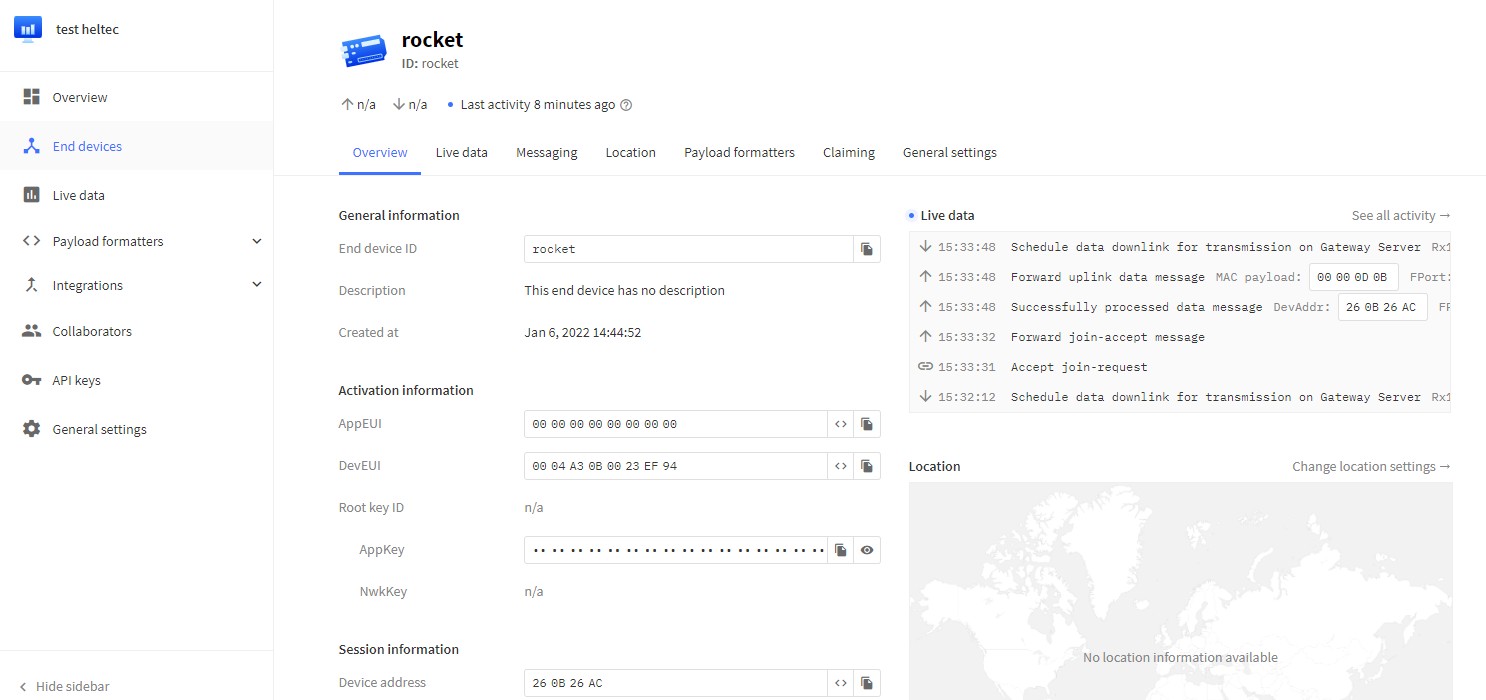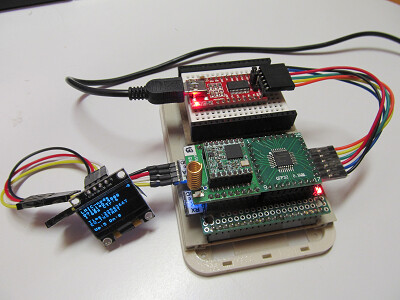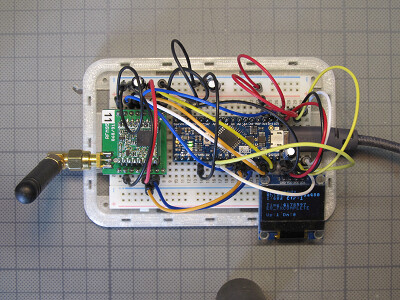
consol for RN2483 device is OK

I see the stick are not tested yet.
6.3 Not yet tested
All supported boards have been tested except below boards for which hardware was not available.
* Heltec Wireless Stick and Wireless Stick Lite.
* BSFrance LoRa32u4 II v1.1 and v1.3 *(v1.0 and v1.2 were tested)*.
* TTGO LoRa32 v1.3.
* TTGO LoRa32 v2.1.6.
* Lolin D32 *(Lolin D32 Pro was tested)*.
I see two things.
- The frequent issue with LMIC of people not reversing the EUI’s has been asked BUT NOT ANSWERED - we know everything else works and this issue has come up a couple of times in the last week.
- A disturbing number of screen shots when text can be used - please @Arnaudroussac, read post formatting guidelines before you fill the forum server up!
Great work, thanks.
Well documented and easy to follow instructions.
This connected my first TTN end device, a TTGO LoRa32 V1.3 (TTN Network layer MAC V1.0.3), through a RAK 7246.
Can confirm that the onboard display does not display. Pity.
If anyone can point out some ideas I’d be happy to try them out.
Hello,
Is it possible to add the support for Adafruit feather m0 32u4 (NOT SAMD)
Thanks
Best
and Arduino MKR WAN 1300. The two boards I have are not supported 
I assume you mean Feather LoRa 32u4.
A Feather M0 32u4 does not exist. The Feather M0 is SAMD21 (not 32u4) based.
Adding support for Adafruit Feather LoRa 32u4 is on my todo list but I’m rather busy at the moment so will take some time.
The MKR WAN 1300 is a totally different beast. I have no experience with it but as far as I’m aware you cannot use the LMIC library with it.
Hello bluejedi,
Thanks, you’re right. Thanks for adding in the todo list.
Best
Hardwired TTN sensor-node prototype with ATmega4808 and RFM95 running LMIC-node LoRaWAN example application. Documentation TBD.

TTN sensor-node with Thinary Nano Every ATmega4808 clone board & RFM95 running LMIC-node LoRaWAN example application. (board_build_variant = nano-4808) Watch the new YouTube video by Andreas Spiess about the ATmega4808 chip. ATmega4808, The New Arduino Chip? - YouTube

Really nice, well done! Great documentation, clear entry points for ‘user’ code, very simple to use.
I’m working on integrating the network time request and how we do our sleep mode, which is not at all integrated with LMICs HAL yet. So it sends the first few uplinks as usual to allow LMIC to send some of its own uplinks I see getting done between first and second ones I ask for, then when it has the network time and figured LMIC has had its say it switches to a hack where the uplinks are scheduled by an alarm rather than the LMIC os stuff, and sleeps between the TX_COMPLETE event and the next alarm. Then it runs a tight loop of run_osloop_once() until the TX_COMPLETE happens. I’m wondering if this leaves some LMIC stuff not done but it’s working so far.
I’d much rather make MCCI LMIC work nicely with the AdaFruit M0 LoRaWAN board so it isn’t always awake, but that may be beyond me. The pin interrupts work, which is something.
I don’t think any of that belongs in your repo. But I will give pull requests for things I think could be worth it. Eg I’ve changed it so setup() doesn’t immediately schedule a call to the processing callback, given it’s going to be ignored while the join happens and tossed away and a new one done when the join completes. I guess this needs to be guarded by a check for OOTA/ABP in setup().
That’s the only downside I see to this - you can’t run it on a Feather M0 on a battery without solar because it’s just too power hungry without sleeping.
It would be nice if sleep support can be added to LMIC-node, but the problem is that it will have to work for all MCU families and all supported boards (where possible).
Unfortunately MCCI LMIC still does not provide any sleep support (hooks/functions) to work with LMIC.
Only when MCCI LMIC adds such support, will it be worthwhile to investigate if it is possible to add sleep support to LMIC-node.
For users who want to add sleep support to their solution, you can start with LMIC-node and then add (deep) sleep support to it yourself (but this is not further described here).
It is currently not possible to add sleep support in a generic manner that works for all MCU (boards) supported by LMIC-node. Different type of MCU will/may require a different implementation.
For discussions related to that subject please start a separate topic.
Sorry for going off topic @bluejedi but looking at the latest release v1.3.0 I see the old pro mini board bsf_pro8mhzatmega328.h, just wondering if you plan to add support for Nano Every or other 4808/4809 dev boards? I like the LMIC-node but MCCI LMIC, memory etc.
Thx, G
Not currently planned but support could be added if there is enough request for it.
(This will require Arduino platform and PlatformIO support and access to the hardware for dev & testing).